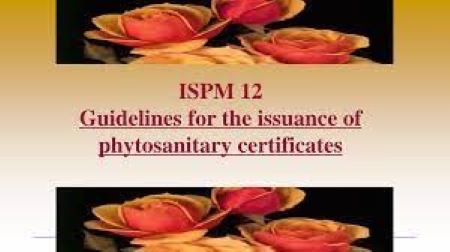From 01 May 2023, paper phytosanitary certificates for imports into Australia must have all required information in accordance with ISPM12, including being signed, dated and stamped. This applies to paper phytosanitary certificates dated on or after 01 May 2023. Phytosanitary certificates are important documents required for the shipment of plants and plant-based products.
For more information about ISPM12, a PDF is available at this LINK.
Phytosanitary certification is used to attest that consignments meet phytosanitary (regarding plants) import requirements and is undertaken by an NPPO (National Plant Protection Organisation). Electronic certification and paperless trading is becoming internationally recognised as the future of government certification (see note regarding ePhytos below).
Today (05 January 2023) the Department of Agriculture, Fisheries and Forestry (DAFF) has issued this notice:
Import Industry Advice Notice
|
DAFF advises the issue is that Australia is receiving some paper phytosanitary certificates that are not signed, dated and stamped in accordance with ISPM 12.
Requirements for paper phytosanitary certificates from 01 May 2023
From 01 May 2023, paper phytosanitary certificates must have all required information in accordance with ISPM12, including being signed, dated and stamped. This applies to paper phytosanitary certificates dated on or after 1 May 2023.
Australia will not accept paper phytosanitary certificates dated on or after 01 May 2023 presented with QR codes only and without a signature, date and stamp.
Australia’s importing country requirements for phytosanitary certificates
Australia accepts phytosanitary certificates that are:
- Delivered via an agreed, secure government-to-government digital exchange, known as electronic certification or ePhyto/eCert. Australia currently only has such an arrangement with New Zealand for use in import clearance.
- Original paper hardcopies issued by trading partners that have been dated, signed, and stamped.
- Certified copies that are copies of an original hardcopy or printouts of an electronic phytosanitary certificate that have been dated, stamped, and countersigned.
On paper certificates, a ‘stamp’ can be in the form of a watermark or logo on the document that has been approved for use by the exporting country and communicated to the Australian IPPC contact point.
A ‘signature’ can be in the form of either a pen-inked signature directly onto the document or a printed image of a signature inserted into the document. Printed names will not be accepted.
Australia’s acceptance of ePhytos or eCerts
Australia only accepts ePhytos or eCerts for use in import clearance where there has been a prior agreement to accept them via a government-to-government electronic exchange. This arrangement currently only applies to the government-to-government exchange of eCerts from New Zealand.
It currently only has what is known as Parallel Exchange status with Indonesia. Countries sending ePhytos or eCerts to Australia without prior agreement and arrangements for electronic exchange cannot be accepted. Paper certification continues to be required until ePhytos or eCerts are bilaterally negotiated between Australia and the exporting NPPO.
Class 19 approved arrangements
Until 01 May 2023, brokers operating under a Class 19 approved arrangement may accept phytosanitary certificates that are not signed, dated and stamped providing they can be verified using the QR code or website link.
From 01 May 2023 onward, brokers or self-reporting importers lodging under a Class 19 approved arrangement must ensure that paper phytosanitary certificates have been signed, dated and stamped.
For other related news about Biosecurity matters see our recent articles: https://collessyoung.com.au/daff-changes-intervention-focus/ and https://collessyoung.com.au/a-bumper-year-for-biosecurity/ .
As licensed Customs Brokers and International Freight Forwarders, Colless Young offers you professional advice on shipping documentation for clearance through Customs and Quarantine for all your consignments. We provide a complete range of import and export logistics services, including warehousing, trucking and fumigation treatment. We are based in Brisbane and handle cargo by sea and air, Australia-wide.


